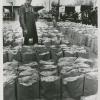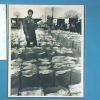H95.18.1030
(25.40 cm HIGH x 20.32 cm WIDE)
Photo shows Bobby Seale standing among grocery bags. Two trucks in the background and several people and members of the Black Panthers. According to the Oakland Tribune, March 31, 1972, article titled "Seale Calls for Additional Panther Fund Donations": The occasion was the Black Panther's Black Community Survival Conference held at Greenman Field, 66th Ave., near East 14th. Bobby Seale, the chairman of the Black Panthers, spoke to a crowd of 4,000 who attened the second session of the party's conference. It was a three day conference, the first day Seale said they gave away 6,700 bags of groceries. On the day this photo was taken, Seale said "...the party could give away 10,000 bags of groceries every week if blacks would boycott white buisnesses in the black community." After his speech, the Panthers gave away 1,500 bags, the crowd rushed in and took the rest (apparently not very orderly). One goal of the conference was to get voters registered. This photo was not used in the Oakland Tribune.
Used: Oakland Tribune
Picture This Information
This artifact is part of the OMCA's Picture This website. More about the context and history of this artifact is available at Picture This.
About the Picture This web project: California's Perspectives on American History is a resource for teachers and students to learn about the experiences of diverse peoples of California by using primary source images from the Oakland Museum of California's collections. Organized into 11 time periods spanning from pre-1769 to the present, more than 300 photographs, drawings, posters, and prints tell stories from the perspectives of different ethnic groups. Historical contexts are provided to offer a framework of California's role in relation to American history.
The National Archives state that primary sources, "fascinate students because they are real and they are personal: history is humanized through them." Picture This invites students to examine the historical record, encouraging them to connect history with real people and explore how images tell stories and convey historical evidence about the human experience. History becomes more than just a series of facts, dates, and events.





